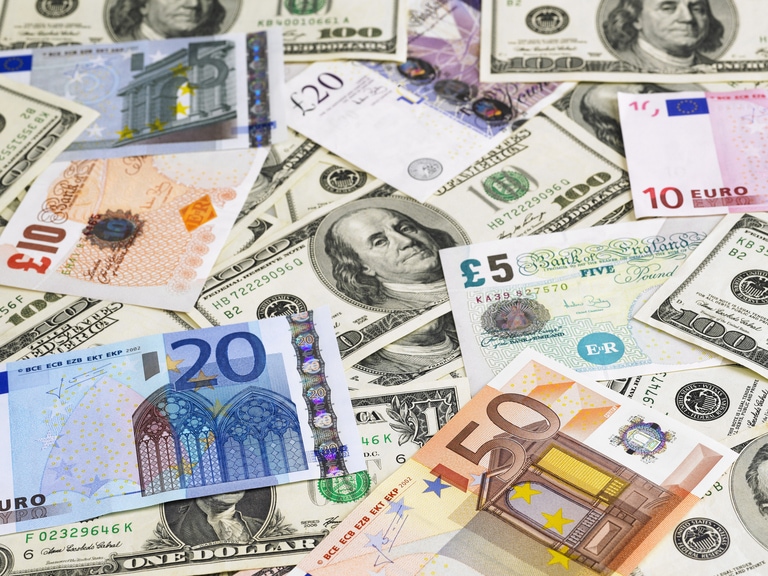Wall Street gained as strong tech earnings defended the bank’s woes. Will the Fed lend a hand to market bulls?
Three US benchmark indices managed to finish higher in April as better-than-expected big tech companies’ first-quarter earnings defended regional banks’ turmoil. The Dow Jones Index rose 2.48%, the S&P 500 was up 1.46%, and Nasdaq was only 0.04% higher. The economic data, however, did not paint a rosy picture, with GDP growth slowing down and inflation sticking, pointing to a stagflation chapter. Given that the regional banking crisis is slowly spreading into the wider banking system through takeover deals, the Fed may have to capitulate in its battle against inflation. The Fed is expected to raise the interest rates for another 25 basis points before hitting a peak, which may be a catalyst for a further market rally. However, it is skeptical for how long the bull can sustain as a rate-cut cycle usually commences when there is an imminent economic threat. Plus, inflation fights may not be done just yet if the upcoming CPI data disappoints market players.
The ASX followed through with Wall Street’s rally. But how will the RBA set the tone?
The ASX 200 rose 1.83% in April, snapping a two-month losing streak as Wall Street’s risk-on lifted broad sentiment, with all 11 sectors finishing higher for the month, particularly the information technology stocks, up 7.48%. A strong rebound in banking sectors has also fueled a broad rally, thanks to easing worries over the US banking system after a slew of positive earnings of the big financial institutions. Miners’ stocks, however, lost steam as China’s economic recovery seems to be tepid. The demand outlook for iron ore stayed gloomy and pressed on resource stocks, such as BHP and Rio Tinto. On a positive note, Australian inflation has finally shown signs of peaking, strengthening bets for the RBA to pause rate hikes for the second consecutive time this month. With labour markets staying tight and wage growth sticking at a high level, cost-of-living may not be solved easily. Hence, the wage price index, employment data, and monthly CPI will still be on the radar this month. Also, China’s economic development and government policies should also be on watch.
The NZX cheered for cooled inflation, but NZD may face the challenge of RBNZ’s rate decision
The NZX 50 was up 1.14% in April and 3.73% year-to-date as the country is slowly recovering from inflation shocks and the RBNZ’s aggressive rate hike campaign. The renewable energy stocks and construction sector showed a steady pace on its rise and led the local equity market’s gains. However, the negative growth in its first-quarter GDP suggests that the county is on the edge of falling into a technical recession if the current quarter extends the economic decline. The most cheerful economic data is that inflation has finally cooled in the first quarter, igniting hopes for the RBNZ to scale back rate hikes. The reserve bank will hold its 2023’s third policy meeting later in May. Hence, market moves will be most likely to follow through its Trans-Tasman peer ASX and Wall Street’s moves. And the New Zealand dollar may face downward pressure amid bets for a slowdown RBNZ.
Chinese stock markets lagged global peers amid intensifying geopolitical tensions and economic uncertainties
Chinese stocks lagged the global market performance as reopening optimism faded off in April. The Hang Send Index declined 2.48% in April, the only major index that finished lower compared with its Asia, US, and EU peers. While China reported better-than-expected first-quarter GDP growth, its April manufacturing PMI unexpectedly contracted for the first time in four months, suggesting the country’s economic recovery lost steam. With the US-China geopolitical tensions intensifying, the US-listed Chinese ADR shares, including Alibaba, JD.com, and Baidu, all slumped between 15% and 20% throughout the month. The first-quarter earnings of these Chinese conglomerates will be on close watch to provide clues to these companies’ development at the back of Beijing’s relaxation on tech crackdowns.
Crude oil slumps amid China’s uncertainties and US recession fears. Will there be a rebounding chance?
Crude oil tumbled below $80 per barrel as the US banking rout sparked recession fears early in the month, and China’s economic recovery seems to be tepid, renewing the demand concerns. Though the outlook darkened for oil markets in April, some positive signs may lead to a rebound in the second quarter. With Northern Hemisphere entering summer, oil demand is expected to pick up, particularly in China and the US. OPEC forecasted global demand would rise by 101.6 million barrels a day in the second and third quarter, and China may account for about 40% as refineries usually enter their peak annual maintenance at the same time, which reduces fuels’ supply. Nonetheless, OPEC+ will not allow oil prices to crash again with possible further output cuts to stabilize oil markets.
Will gold pop again?
Despite wide swings in the US bond yields, gold endured well, nearing an all-time high level. The Fed may do the precious metal a favor if it indicates a pause in rate hikes in the coming month, as the gold price is negatively correlated with the treasury yields. There might be a chance for the metal to pop again and reach a fresh high if this happens, though a near-term pullback is expected as gold may have been overbought.






